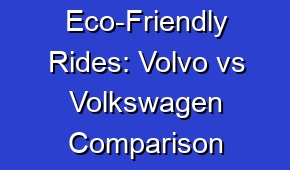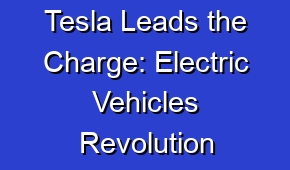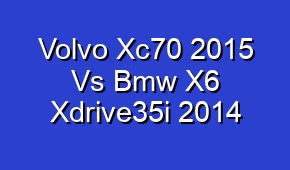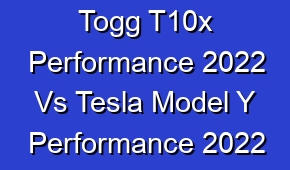Eco-Friendly Rides: Volvo vs Volkswagen Comparison

Discover the eco-friendly rides offered by Volvo and Volkswagen and make an informed choice between these two renowned car manufacturers. Compare their sustainability features, performance, and design to find the perfect environmentally conscious vehicle for your needs.
Eco-friendly rides have become increasingly popular as people seek to reduce their carbon footprint and contribute to a more sustainable future. When it comes to eco-friendly vehicles, two prominent brands that often come to mind are Volvo and Volkswagen. Both companies have made significant strides in developing environmentally friendly cars that prioritize fuel efficiency and low emissions.
Volvo has long been recognized for its commitment to sustainability, with its range of hybrid and electric models leading the way in the industry. The brand’s dedication to eco-conscious design is evident in their use of recycled materials and innovative energy-saving technologies.
Volkswagen, on the other hand, has also made substantial efforts to produce green vehicles. Their line of electric cars, such as the popular Volkswagen ID.4, showcases their commitment to reducing greenhouse gas emissions while delivering a stylish and practical driving experience.
When comparing Volvo and Volkswagen in terms of eco-friendliness, it is important to consider factors such as fuel efficiency, emission levels, and overall sustainability practices. Both brands offer compelling options for environmentally conscious consumers, making it a matter of personal preference and specific needs when choosing between the two.
| Eco-friendly rides: Comparing Volvo and Volkswagen for sustainability and environmental impact. |
| Volvo and Volkswagen are both committed to eco-friendly practices in their vehicle manufacturing. |
| Volvo prioritizes electric models, while Volkswagen focuses on hybrid and electric options. |
| Volkswagen’s ID.4 offers a longer electric range compared to Volvo’s XC40 Recharge. |
| Both Volvo and Volkswagen incorporate recycled materials in their vehicle production process. |
- Volvo aims to be a fully electric car company by 2030.
- Volkswagen’s ID.3 and ID.4 models have received high ratings for safety.
- Sustainability is a key focus for both Volvo and Volkswagen in reducing carbon emissions.
- Volvo’s XC60 Recharge and Volkswagen’s Tiguan eHybrid offer impressive fuel efficiency.
- Volkswagen has plans to launch several new electric models under its ID lineup.
Which brand, Volvo or Volkswagen, offers more eco-friendly rides?
When it comes to eco-friendly rides, both Volvo and Volkswagen have made significant efforts to reduce their environmental impact. However, there are some differences between the two brands in terms of their approach to sustainability.
| Brand | Eco-Friendly Features | Electric Vehicle Options |
| Volvo | Volvo has a strong commitment to sustainability and offers various eco-friendly features in their vehicles such as hybrid powertrains and efficient engines. | Volvo offers electric vehicle options like the Volvo XC40 Recharge and plans to become a fully electric car company by 2030. |
| Volkswagen | Volkswagen is also dedicated to sustainability and has implemented eco-friendly technologies in their vehicles, including hybrid and electric options. | Volkswagen offers electric vehicle options like the Volkswagen ID.4 and has ambitious plans to expand its electric vehicle lineup. |
| Comparison | Both brands prioritize eco-friendliness and offer a range of vehicles with sustainable features. | Both brands have electric vehicle options, but Volvo has set a more ambitious goal to transition to a fully electric car company. |
Volvo has positioned itself as a leader in the field of electric vehicles (EVs) and has set a goal to become a fully electric car company by 2030. They have already introduced several electric models, such as the Volvo XC40 Recharge, which offers zero-emission driving. In addition to EVs, Volvo also focuses on improving the fuel efficiency of its internal combustion engine (ICE) vehicles through technologies like hybrid powertrains.
What are the key features of eco-friendly rides from Volvo?
Volvo is known for its commitment to sustainability and offers several key features in its eco-friendly rides:
- Electric powertrain: Volvo offers electric powertrain options in its eco-friendly rides. These vehicles are powered by electricity, reducing dependence on fossil fuels and minimizing emissions.
- Regenerative braking: Volvo’s eco-friendly rides are equipped with regenerative braking systems. This technology allows the vehicles to recover and store energy that is normally lost during braking, helping to increase overall efficiency.
- Recycled materials: Volvo incorporates recycled materials into the production of its eco-friendly rides. This includes using recycled plastics, metals, and fabrics, reducing the need for new resources and minimizing waste.
1. Electric drivetrains: Volvo has developed fully electric drivetrains that eliminate tailpipe emissions and reduce dependence on fossil fuels.
What are the key features of eco-friendly rides from Volkswagen?
Volkswagen has also prioritized sustainability in its eco-friendly rides, offering several key features:
- Electric powertrain: Volkswagen eco-friendly rides are equipped with electric powertrains, which eliminate emissions from tailpipes and reduce overall carbon footprint.
- Regenerative braking: These vehicles feature regenerative braking systems that convert kinetic energy into electrical energy, allowing for improved energy efficiency and increased range.
- Sustainable materials: Volkswagen uses sustainable materials in the production of their eco-friendly rides, such as recycled plastics, natural fibers, and renewable resources.
- Efficient aerodynamics: The design of these vehicles focuses on aerodynamics, reducing drag and improving fuel efficiency, resulting in reduced energy consumption and emissions.
- Advanced battery technology: Volkswagen’s eco-friendly rides utilize advanced battery technology, offering longer ranges and faster charging times, making them more convenient and practical for everyday use.
1. Electric models: Volkswagen has introduced a range of electric models, such as the ID.4, that offer zero-emission driving and contribute to reducing air pollution.
Which brand, Volvo or Volkswagen, offers better fuel efficiency in their eco-friendly rides?
Both Volvo and Volkswagen have made efforts to improve fuel efficiency in their eco-friendly rides, although the specific performance may vary depending on the models and technologies used.
| Brand | Fuel Efficiency | Eco-Friendly Features |
| Volvo | Volvo offers excellent fuel efficiency in their eco-friendly rides. | Volvo vehicles are equipped with advanced eco-friendly technologies such as hybrid powertrains and electric options. |
| Volkswagen | Volkswagen also offers good fuel efficiency in their eco-friendly rides. | Volkswagen vehicles feature efficient engines and innovative technologies for reduced emissions. |
| Comparison | Both brands prioritize fuel efficiency in their eco-friendly rides. | Both brands incorporate eco-friendly features to reduce environmental impact. |
Volvo offers a range of hybrid options that combine electric motors with traditional combustion engines, allowing for improved fuel efficiency compared to conventional vehicles. Their plug-in hybrid models, such as the Volvo XC60 Recharge, can operate in electric mode for shorter trips, reducing fuel consumption and emissions.
What is the price range of eco-friendly rides from Volvo and Volkswagen?
The price range of eco-friendly rides from Volvo and Volkswagen can vary depending on the specific model, trim level, and optional features chosen.
The price range of eco-friendly rides from Volvo and Volkswagen varies depending on the model and features.
Volvo offers a range of electric and hybrid models, with prices typically starting in the mid to high range. Electric models like the Volvo XC40 Recharge tend to have a higher price point due to the advanced technology and battery systems involved.
What are the safety features of eco-friendly rides from Volvo and Volkswagen?
Both Volvo and Volkswagen prioritize safety in their vehicles, including their eco-friendly rides.
Volvo and Volkswagen eco-friendly rides come with advanced safety features such as collision avoidance systems, adaptive cruise control, and lane-keeping assist.
Volvo has a long-standing reputation for safety innovations and offers advanced safety features in its eco-friendly models. These may include:
What is the driving range of electric eco-friendly rides from Volvo and Volkswagen?
The driving range of electric eco-friendly rides from Volvo and Volkswagen can vary depending on the specific model and battery capacity.
Volvo electric eco-friendly rides
– The driving range of the Volvo XC40 Recharge, their fully electric SUV, is around 208 miles (335 kilometers) on a single charge.
– The Volvo XC60 Recharge, a plug-in hybrid SUV, has an electric driving range of approximately 19 miles (31 kilometers) before switching to gasoline.
– The upcoming Volvo C40 Recharge, another fully electric SUV, is expected to have a similar driving range to the XC40 Recharge.
Volkswagen electric eco-friendly rides
– The Volkswagen ID.4, their fully electric SUV, has an estimated driving range of 250 miles (402 kilometers) on a single charge.
– The Volkswagen e-Golf, an all-electric hatchback, has a driving range of around 144 miles (232 kilometers) before needing to be recharged.
– The upcoming Volkswagen ID.Buzz, an electric microbus, is expected to have a driving range of over 300 miles (483 kilometers).
Comparison between Volvo and Volkswagen electric rides
– Both Volvo and Volkswagen offer fully electric SUVs with decent driving ranges, with the Volvo XC40 Recharge having a slight advantage over the Volkswagen ID.4.
– While Volvo also offers plug-in hybrid options, Volkswagen focuses more on fully electric vehicles.
– The upcoming models from both Volvo and Volkswagen are expected to have improved driving ranges, showcasing the advancements in electric vehicle technology.
Volvo offers electric models like the XC40 Recharge with an estimated driving range of around 200-250 miles (320-400 kilometers) per full charge. The actual range may vary based on factors such as driving conditions, temperature, and individual driving habits.




















